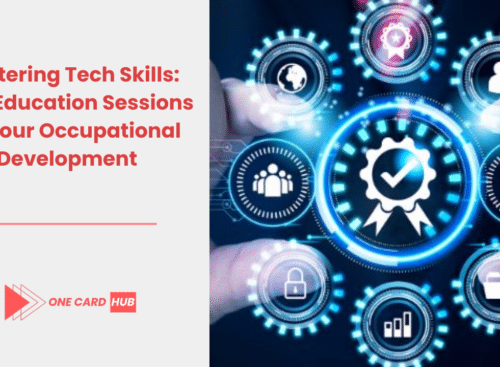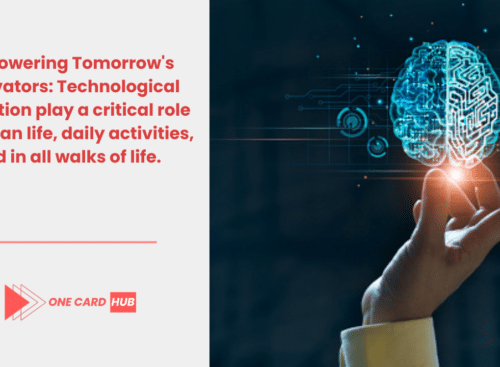Learning tech in this context is an opportunity to be the captain of your ship as you explore familiar coastal areas, but you also have to be prepared to open a new horizon by crossing the uncharted sea. The journey from an amateur to a Professional in the Technology world is a thrilling ups and downs ride, that a' has its own share of challenges, learning curves and rates of success. This path changes you, not only in terms of body shape but also in the other aspects of life, which require courage, open-mindedness, and a well-defined direction. Our article will detail a holistic guide for you to make a journey through the waves of the technology domain, preparing yourself to be a commander on the wheel of mastery and beyond.
Charting Your Course: Eliminating What's Most Interesting in Tech to You
The very first thing that you would need to do is to recognize what fields in tecchology you would like to contend in and master. The tech industry covers many ground, being divided among tiers like software engineering, data science, artificial intelligence (AI), cyber security and many other fields. Start by investigating a range of specializations, look at these through the lenses of their influence while keeping your passion and your personal career nature in mind. The initial discovery (of my educational path) process throughout the explorational phase is crucial, it is sort of the beginning of your educational journey.
Gathering Supplies: Regarding the Resources a student should Take the time to weigh the advantages and disadvantages of each resource.
After you are sure about the area you would prefer to focus on, the ideal next thing is to obtain the suitable learning tools. The Internet is full with learning resources that a techie can use, ranging from courses and camps via the internet to textbooks and an open source GitHub online project. Finding activities or formats that respond to the way you learn, for instance, by using interactive coding platforms, video tutorials, or by completing practical assignments, will make learning a one-way street. Remember that the very quality of your minimal supplies can influence what is to happen next.
Setting Sail: First steps on Your Lifelong Educational Voyage
With your approval, equipment, and the courses set, it’s time for the voyage to begin, navigation towards your destination. Learning starts with foundational concepts and moves on to more complex issues later on. Here also, the practice is significant in the process of the teaching technology; there are outcomes in the shape of projecting or activities. Interact with online groups or local clubs and forums where you get to rub minds with experts and bring their years of experience to your bank.
Navigating Stormy Waters: On the whole, the course has turned out to be a great success that could hardly have been anticipated at the beginning of the semester.
Although challenges are the norm in learning, we are equipped with the necessary skills to surpass them. If something does not go like a planned you will encounter difficult concepts, coding errors or project crashes. Don’t just look at these challenges as your enemies, but also see them as the trainings for your personal development. Utilize assets like group forums, help technology clubs and mentorship to find a way to overcome such obstacles. You can harness the strength of perseverance and tenacity and they will be your allies in the process of overcoming problems.
Charting Progress: Jericho Pick flowering plants involved intricate designs, and were distinguished by fine motifs, including buds and leaves.
During your educational experience, you will realize how the lifelong learning is indispensable in this field and it becomes an opportunity for specialization. Innovation is the key word for the tech field as the constantly evolving technologies absorb the emerging advancements making them the state of the art in no time. Try to get the latest information about the trends on market, attend events and conferences and try to increase your competence in a particular area or niche. Hyperspecialization gives you an edge as a known professional in your niche, taking you one step closer to highly competitive openings and threats.
Reaching New Shores: Promising leaders are nurtured with professional and networking development initiatives.
Being learning to practicing needs effective utilization of ones skill sets in the actual context. Participate in open source community projects, try to apply as an intern, or even come up with your own tailored technical solutions. Networking and building up contacts take a special place at this stage; you should attend industry events or themed parties, where you could do publicity of your projects. These connections can be a great source of job offers and facilitating collaborations with other biomedical researchers.
The Journey Continues: Through continuous up-skilling, I believe a successful leader must never stop learning and appreciate the guidance of a knowledgeable mentor.
Being at pro level in our tech-driven world is one of the stations in the train of lifelong learning; it isn't the goal, but rather a reward for the efforts. To empower more people and strengthen the community, develop your skills and then engage in mentoring, teaching or while contributing to the educational resources. Lifelong learning assists you to update your skills and accordingly takes profession front in technology. The passage on learning the tech education starting from a noob to a pro is challenging but rewarding as long as you have dedication, inquisitiveness and above all a love for tech innovations. The reverse hiring process implies drawing a path, gathering the suitable ones, and getting used to the arising challenges along the way, until you get the top of your digital domain. Bare in mind that the way learning is percieved is very individualistic, while it is a path of ceavless elements that lead to a greater understanding and perspecive.
The old saying of “failure” as a stepping stone in learning should not be alien to anyone.
It is not only a chance but also a vital part of the learning process when talking about technology and putting failure to the equation. The mistakes in the boilerplate code, the lousy projects, all the debugging and developing are the doors to deep understanding and perfection. Accept that these failures are part of the growth and learn how to solve they became right in the future. Experiencing challenges in university life often triggers resilience. Subsequently, what seems to be a setback oftentimes offers insights for further development.
Create a seasoning of Mates.
To burden some and not others is indefensible, while on the other hand, being a community member fills this gap. Participate notably in forums, social media clubs, and tech meetup hubs. The platform provides the community support of peer exchange, advisory, and useful feedback crucial for both people who are at the beginning of their career and more senior ones. You get to inform others by telling them about and your own experiences as well as this strengthens your commitment to and positions you as technostack.
Stay Agile and Adaptable
The domain of tech is always in a state of flux as new languages (programming language), frameworks (the technique of delivering something), and technologies are being constantly developed. It is critical stay adaptable and welcome new experiences constantly. You need to be flexible when it comes to adjusting your focus to align with the market’s changes or incorporating new approaches along with modern technology. A tech professional who studies continuously personifies the key essence of being in the knowledge profession, which ensures you are always needed and relevant in the specific industry.
Seek Real-World Experience
In the case of tech education theory and practice play a crucial rol. To learn and apply the skills are most important. Try putting them into practice from the very beginning of your student life. Mentorship could be through internships or through other opportunities like working on open-source projects, freelancing or developing your own software or applications. Not only your cover letter gains with the real world exposure, but also you become a person with deeper understanding of what is behind building, deploying and sustaining of tech applications in the live environment.
Invest in Soft Skills
Businesses need the people who can not only be technical in their approach but also the ones who have communication, teamwork, problem-solving and time management skills as much. These abilities increase your ability to perform well in group situations, deal with interactions at work, and uphold instructions in work to achieve results. Set aside the time to enhance such building blocks, which are necessary for a successful communication at work and a professional advancement.
Develop Vision and Ideal Interests, Recheck Yourself Continuously
Developing a good vision for the deep technology career allows to make the most rational choice regarding the steps you take towards this career path. Have high ambitions; however you should stay calm needing adaptations to meet the new conditions as the industry evolves. Periodically re-evaluating and revisiting the goals will enable one to realize if the course that has been undertaken is in line with the planned career.
Devote yourself to the community and contribute to it.
With time, you may consider the different modalities of lending a hand to the tech competition. This could be coaching, training, development of emerging platforms, or presentation of speeches at conferences. It is no less a motivation for yourself to utilize your experience and knowledge amidst others. In addition, it underlines the fact that you become a thought leader in your field. The route to the pro level begins with the initiation of a cycle with learning, development, and contribution as the components. The ability to manage them requires not only technical competence but also a growth mindset of being flexible, resilient and persistent in learning continuously. By endorsing the particular values and immersing yourself into tech hubs you will be able to find your way in tech realm which offers you unlimited number of chances and accomplishments of the tech environment.
FAQ: The problematic Decision I am facing is Tech Education.
Q1: How do I begin my personal journey in technological education?
A1: First, analyze the varying tech aspects which appeal to you the most, e.g. software development,
data analysis, and cybersecurity, and narrow down your focus. Employ online resources e.g. tutorials, courses, and boot camps to understand some of the basic programming or engineering principles that you need to succeed in the field.
Q2: What learning tool is most suitable for the gaining tech skills?
A2: The best learning directions differ based on your personal learners' styles and the specific tech skill you intend to master. Online courses (Coursera, Udemy) and coding boot camps constitute the main source of learning. In addition, YouTube guides and project-based platforms (e.g., Github) are useful sources of information as well. Interactive learning platforms like Codecademy and LeetCode are invaluable also for the hand-on training.
Q3: In the tech industry is degree as important as in the computer science?
A3: A computer science degree could be of great significance when you apply for tech positions, but it is not compulsory for most tech roles. Applied competencies, internships, and the opportunities to display your mastery in things like project-based learning or into open-source software development may be better prospects rather than academic prowess.
Q4: How can I deal with my studies if it seems to be quite complicated for me?
A4: Discovering different difficulties is as if always fate during the learning process. Leveraging the online communities, forums (for instance, Stack Overflow) as well as mentorship programs might offer a starting point for your learning journey. Secondly, maintain repetitive practice, ensure that you separate complex problems into smaller parts in an attempt to understand basic concepts deeply.
Q5: The hottest tech trends change overnight, and upon updating my skills, how do I stay on top of all the new technologies?
A5: In the age of social media, following tech
news websites, blogs, and the social media outlets of orgs and celeb techies are your best bet. Getting associated with them should be the medium of information updates because of latest trends and technologies.
Q6: Does one need to go deep early in a tech niche (like hardware, software, data science, etc.) is the question?
A6: Initially, specialization is not a necessity but, later on, you should focus on one area of expertise to make your candidacy more competitive or in-demand. Take into account including an addition of specialization when you reach the point when you have in you a solid ground and know where your interests as well your market match.
Q7: How hands on can I be in tech ken also?
A7: Reality-based practical experience that can be obtained in form of internships, work for high school or work for open-
source, or contribute to any personal project will also be useful. These experiences will be useful in checking what you have learned while giving you visibility of real-world application of tech for day-to-day scenarios.
Q8: What kind of soft skills are necessary to be successful in this tech industry?
A8: Further to technical skills, the set of soft skills needed to show communication, teamwork, problem-solving, and time management are inevitable. Among team members, such skills aid effectively face common as well, overcome hurdles and participate in assignments fruitfully.
Q9: What should be my next course of action? Where should I begin; from education to career in the field of technology?
A9: Put up your projects together to demonstrate your capability, communicate with professionals in the area, and develop your interviewing skills. One clear way is to look for internships or entry-level jobs that allow you to gain your footing into the industry.
Q10: What significance have the mentors in tech learning?
A10: Mentorship might be a game-changer while onto your technology academic course by means of consultation, direction and coaching. A mentor can guide you on problems, lead you to a right decision-making that will surely contribute to your good career prospects, and also give you the advantage of working together to achieve a common goal.






Related posts